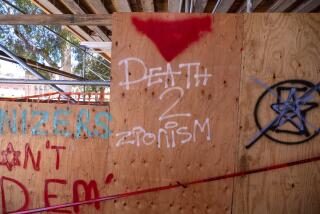Islamic Group Challenges PLO Over Palestine
- Share via
GAZA, Israeli-Occupied Gaza Strip — Neither the Palestine Liberation Organization nor anyone else has the right to endorse Israeli rule over any part of historic Palestine, according to an underground “covenant” produced by an influential Islamic fundamentalist group here.
The document, a copy of which was obtained by The Times, was apparently produced in answer to recent statements by PLO officials that they are preparing to implicitly recognize Israel as part of a move toward trying to create an adjacent Palestinian state.
See Threat to Unity
Both Israeli and Palestinian nationalist sources described the declaration as a threat to the extraordinary unity that has been shown by West Bank and Gaza Strip Palestinians during their nearly nine-month-old anti-Israeli uprising.
By calling for jihad, or holy war, as “the only solution to the Palestine problem,” the covenant is seen as undermining support in the occupied territories for any moderate PLO political initiative.
Palestine “cannot be given up in part or ceded,” the document says. “No one has this right. No Arab country, nor all the Arab countries together, no king or president, nor all the kings and presidents together have that right. Neither the PLO nor any other organization has that right, because Palestine is entrusted to Muslims for all generations.”
A source considered close to Yasser Arafat’s dominant Fatah wing of the PLO called the 40-page Islamic declaration “very dramatic” and added: “It can make trouble for the intifada (the Arabic name for the uprising).”
The covenant, dated Aug. 18 and issued under the name of the Islamic Resistance Movement/Palestine, appears at a time of growing tensions between the predominantly secular PLO nationalists and Palestinian religious fundamentalists. The fundamentalists are strongest here in overcrowded Gaza, where the uprising began and where it has been particularly violent. But in recent weeks they have also appeared to be gaining support on the West Bank of the Jordan River, long considered a secular stronghold.
Late last month, the Islamic Resistance Movement, known by its Arabic acronym as HAMAS, enforced a full commercial strike in major West Bank towns against the wishes of the secular intifada leadership. A few days later, a second HAMAS effort to enforce a strike set off scuffling in the West Bank town of Ramallah between secular and religious activists.
“It seems for the last week, or maybe two, the differences of views and all the old divisions between the fundamentalists and the secularists have sharpened and once again come into the open,” a senior Israeli security source commented.
Encouraged by Israelis
Palestinian sources say that Israeli officials have encouraged such divisions as a means of weakening the Palestinian cause. The government has allowed some fundamentalists to operate semi-openly here in Gaza, for example, while cracking down on militant PLO factions.
“I have my suspicions that over the last 10 years the Israelis tried to encourage fundamentalism as a power to curb nationalism,” said Rashad Shawa, a former Gaza mayor and head of a prominent local clan. “But to their disappointment, (the various groups) joined hands against the Israeli occupation.”
That unity was particularly noticeable in the first months of the uprising, and it appears that HAMAS is eager to keep its differences with the PLO from getting out of hand.
The covenant describes the PLO as “the nearest of the near to the Islamic Resistance Movement. In it is the father, the brother, the relative and the friend. . . . We share the same homeland, the same pain, the same fate and the same enemy.”
However, the document argues, the PLO is “affected by the ideological confusion in the Arab world and has adopted secularism.”
“For me, a secular state is out of the question,” said Sheik Akhmad Yassin, a prominent Islamic leader here. In an interview at his home in a particularly squalid Gaza neighborhood, Yassin, who is paralyzed from the neck down, said that creation of neighboring Israeli and Palestinian states “is not a satisfactory solution. . . . The solution we are looking for is a unified Palestine.”
The covenant describes the underground HAMAS as “one of the wings of the Muslim Brotherhood in Palestine.” The brotherhood originated in Egypt in 1929 with the aim of imposing Islamic law throughout the Arab world.
Suspected by Israelis
Yassin is suspected by the Israelis of being a top leader of HAMAS. He evaded direct questions about his role, although he did say that “according to my information” the group has its “secret actions or struggle.” The bearded Yassin said police searched his home last week for the second time since the uprising began last December.
The new HAMAS covenant defines all of historic Palestine--including Israel and the occupied territories--as “an Islamic trust for all the generations of Muslims until the resurrection.” In an apparent reference to recent PLO statements, the document declares that “various initiatives, peace proposals and international conferences run counter to the principles of the Islamic Resistance Movement, since giving up part of Palestine is like giving up part of religion.”
The covenant rejects proposals for an international peace conference, arguing that it would “give the infidels the role of arbiter over the land of the Muslims. When have infidels ever dealt justly with believers?” it asked. “The only solution to the Palestinian problem is by jihad. All initiatives, conferences and proposals are a waste of time.”
The document describes HAMAS as “a humanitarian movement that protects human rights and is committed to Islamic tolerance toward other religions.” It is not hostile, it adds, “to anyone who does not stand in its way. In Islam, followers of Christianity and Judaism can live in safety and security.”
However, the covenant cites well-known anti-Semitic tracts in condemning the Jewish national movement.
More to Read
Sign up for Essential California
The most important California stories and recommendations in your inbox every morning.
You may occasionally receive promotional content from the Los Angeles Times.













